Questions with Answers, Solution | Life Mathematics | Chapter 4 | 8th Maths - Exercise 4.4 (Compound Variation, Time and Work) | 8th Maths : Chapter 4 : Life Mathematics
Chapter: 8th Maths : Chapter 4 : Life Mathematics
Exercise 4.4 (Compound Variation, Time and Work)
Exercise
4.4
1. Fill in the blanks:
(i) A can
finish a job in 3 days whereas B finishes it in 6 days. The time taken to complete
the job working together is __________days. [Answer: 2
days]
(ii) If 5
persons can do 5 jobs in 5 days, then 50 persons can do 50 jobs in ________ days.
[Answer: 5]
(iii) A can
do a work in 24 days. If A and B together can finish the work in 6 days, then B
alone can finish the work in ________ days. [Answer: 8]
(iv) A alone
can do a piece of work in 35 days. If B is 40% more efficient than A, then B will
finish the work in ___________days. [Answer: 25]
(v) A alone
can do a work in 10 days and B alone in 15 days. They undertook the work for ₹200000.
The amount that A will get is ________. [Answer: ₹ 1,20,000]
2. 210 men working 12 hours a day can
finish a job in 18 days. How many men are required to finish the job in 20 days
working 14 hours a day?
Solution:
Let the required number of men be x.

More working hours ⇒ less men required.
∴ It is inverse proportion
∴ Multiflying factor is
12/14
Also more number of days ⇒ less men
∴ It is an inverse
proportion
∴ Multiplying factor is
18/20
∴ x = 210 × [12/14] × [18/20]
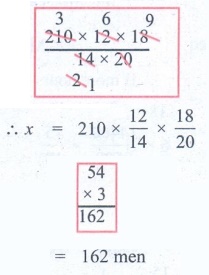
= 162 men
162 men are required.
3. A cement factory makes 7000 cement
bags in 12 days with the help of 36 machines. How many bags can be made in 18 days
using 24 machines?
Solution:
Let the required number of cement bags be x.

Number of days more ⇒ More cement bags.
∴ It is direct variation.
∴ The Multiflying factor =
18/12
Number of machines more ⇒ More cement bags.
∴ It is direct variation.
∴ The Multiflying factor =
24/36
∴ x = 7000 × [18/12] × [24/36]
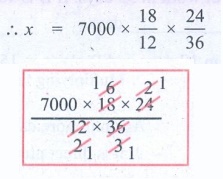
x = 7000 cement bags
7000 cement bags can be made.
4. A soap factory produces 9600 soaps
in 6 days working 15 hours a day. In how many days will it produce 14400 soaps working
3 more hours a day?
Solution:
Let the required number of days be x.

To produce more soaps more days required.
∴ It is direct proportion.
∴ Multiflying factor =
14400/9600
If more hours spend, less days required.
∴ It is indirect
proportion.
∴ Multiflying factor =
15/18
∴ x = 6 × (14400/9600) × (15/18)
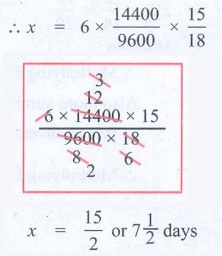
x = 15/2 or 7 1/2 days
15/2 days will be needed.
5. If 6 container lorries can transport
135 tonnes of goods in 5 days, how many more lorries are required to transport 180
tonnes of goods in 4 days?
Solution:
Let the number of lorries required more = x.

As the goods are more ⇒ More lorries are needed to
transport.
∴ It is direct proportion.
∴ Multiflying factor =
180/135
Again if more days ⇒ less number of lorries enough.
∴ It is direct proportion.
∴ Multiplying factor = 5/4
∴ 6 + x = 6 × [180 / 135] × [5 / 4]
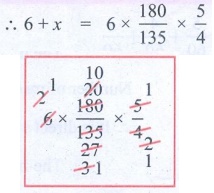
6 + x = 10
x = 10 − 6
x = 4
∴ 4 more lorries are required.
6. A can do a piece of work in 12 hours,
B and C can do it 3 hours whereas A and C can do it in 6 hours. How long will B
alone take to do the same work?
Solution:
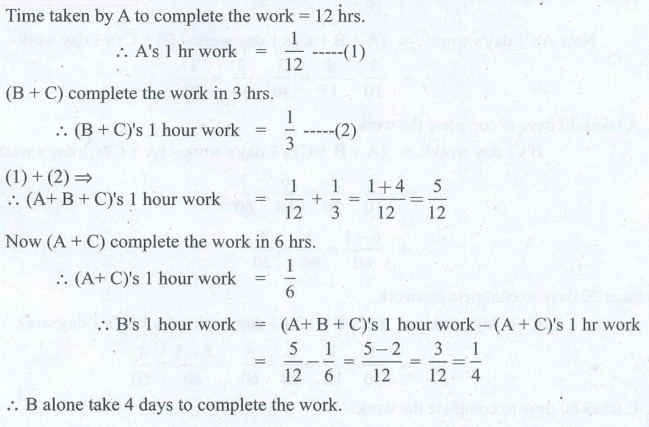
Solution 2:
Time taken by A to complete the work = 12 hrs.
∴ A's 1 hr work = 1/12 ………
(1)
(B + C) complete the work in 3 hrs.
∴ (B + C)'s 1 hour work =
1/3 ……… (2)
(l) + (2) =>
∴ (A+ B + C)'s 1 hour work
= (1/12) + (1/3) = [1 + 4] / 12 = 5/12
Now (A + C) complete the work in 6 hrs.
∴ (A+ C)'s 1 hour work =
1/6
∴ B's 1 hour work = (A+ B + C)'s 1 hour work − (A + C)'s 1 hr work
= (5/12) – (1/6) = [5 – 2] / 12 = 3/12 = 1/4
∴ B alone take 4 days to complete the work.
7. A and B can do a piece of work in
12 days, while B and C can do it in 15 days whereas A and C can do it in 20 days.
How long would each take to do the same work?
Solution:
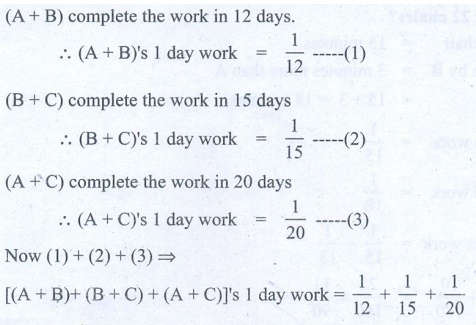
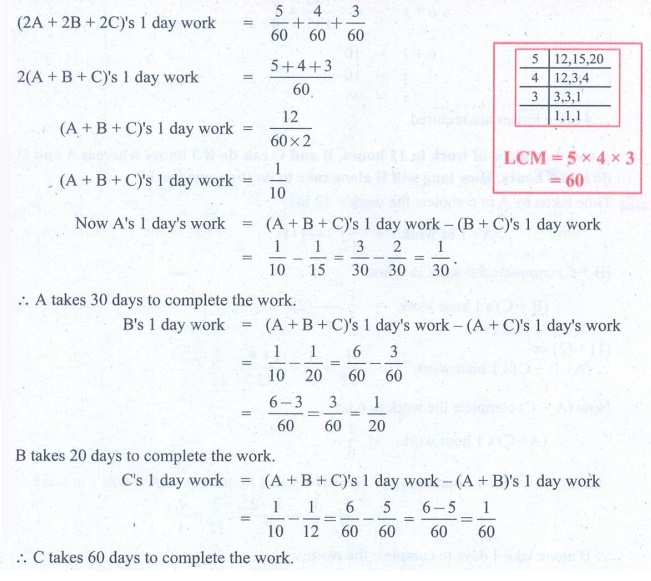
Solution 2:
(A + B) complete the work in 12 days.
∴ (A + B)'s 1 day work =
1/12 ……(1)
(B + C) complete the work in 15 days
∴ (B + C)'s 1 day work =
1/15 ……….(2)
(A + C) complete the work in 20 days
∴ (A + C)'s 1 day work =
1/20 ………(3)
Now (l) + (2) + (3) =>
[(A + B) + (B + C) + (A + C)]'s 1 day work = 1/12 + 1/15 + 1/20
(2A + 2B + 2C)’s 1 day work = 5/60 + 4/60 + 3/60
2(A + B + C)’s 1 day work = [5 + 4 + 3] / 60
(A + B + C)’s 1 day work = 12 / [60 × 2]
(A + B + C)’s 1 day work = 1/10
Now A’s 1 day work = (A + B + C)’s 1 day work − (B + C)'s 1 day
work
= 1/10 – 1/15 = 3/30 – 2/30 = 1/30.
∴ A takes 30 days to
complete the work.
B's 1 day work = (A + B + C)'s 1 day's work − (A + C)'s 1 day's
work
= 1/10 – 1/20 = 6/60 – 3/60
= [6 – 3] / 60 = 3/60 =
1/20
B takes 20 days to complete the work.
C's 1 day work = (A + B + C)'s 1 day work − (A + B)'s 1 day work
= 1/10 – 1/12 = 6/60 – 5/60 = [6 – 5] / 60 = 1/60
∴ C takes 60 days to
complete the work.
8. Carpenter A takes 15 minutes to fit
the parts of a chair while Carpenter B takes 3 minutes more than A to do the same
work. Working together, how long will it take for them to fit the parts for 22 chairs?
Solution:
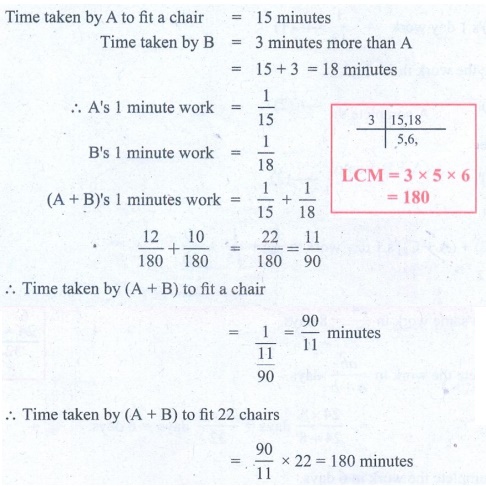
Solution 2:
Time taken by A to fit a chair = 15 minutes
Time taken by B = 3 minutes more than A
= 15 + 3 = 18 minutes
∴ A's 1 minute work = 1/15
B's 1 minute work = 1/18
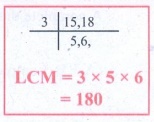
(A + B)'s 1 minutes work = 1/15 + 1/18
12/180 + 10/180 = 22/180 = 11/90
∴ Time taken by (A + B) to fit a chair
= 1 / (11/90) = 90/11 minutes
∴ Time taken by (A + B) to fit 22 chairs
= (90/11) × 22 = 180 minutes
9. A can do a work in 45 days. He works
at it for 15 days and then, B alone finishes the remaining work in 24 days. Find
the time taken to complete 80% of the work, if they work together.
Solution:
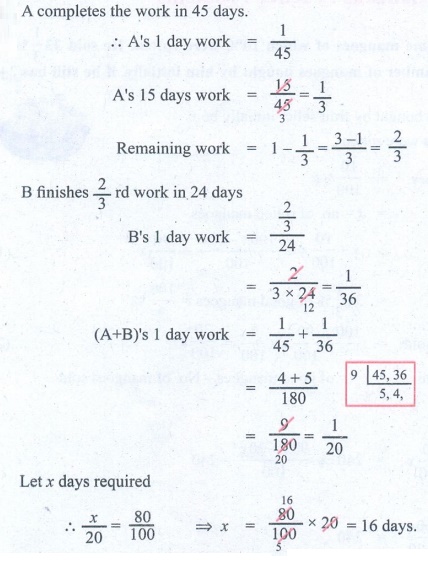
Solution 2:
A completes the work in 45
days.
∴ A's 1 day work = 1 / 45
A's 15 days work = 15/45 = 1/3
Remaining work = 1 – (1/3) = [3
– 1] / 3 = 2/3
B finishes 2/3 rd work in 24
days
B's 1 day work = (2/3) / 24
= 2 / [3 × 24] = 1/36
(A+B)'s 1 day work = [1 / 45]
+ [1 / 36]
= [4 + 5] / 180
= 9 / 180 = 1/20
Let x days required
∴ x / 20 = 80 / 100 ⇒ x = [80 / 100] × 20 = 16 days.
10. A is thrice as fast as B. If B can
do a piece of work in 24 days, then find the number of days they will take to complete
the work together.
Solution:
If B does the work in 3 days, A will do it in 1 day.
B complete the work in 24 days.

They together complete the work in 6 days.
Solution 2:
If B does the work in 3 days, A will do it in 1 day.
B complete the work in 24 days.
∴ A complete the same work
in 24/3 = 8 days.
∴ (A + B) complete the
work in ab / [ a + b]
days
= ( [24 × 8] / [24 + 8] ) days = ( [24 × 8] / 32 ) days = 6
days.
They together complete the work in 6 days.
Exercise 4.4
1. (i) 2 (ii) 5 (iii)
8 (iv) 25 (v) ₹1,20,000
2. 162 men
3. 7000 cement bags
4. 7 1/2 days
5. 4 more lorries
6. 4 hours
7. A- 30 days, B -20
days, C-60 days
8. 180 minutes
9. 16 days
10. 6 days
Related Topics